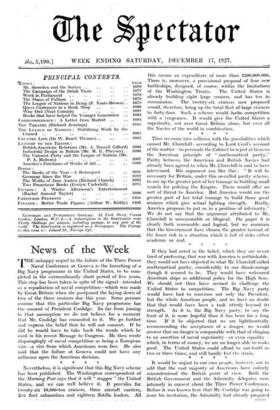Thus we come into collision with the possibilities which caused
Mr. Churchill—according to Lord Cecil's account of the matter—to persuade the Cabinet to reject at Geneva the American principle of " mathematical parity." Parity between the American and British Navies had already been agreed to when Mr. Churchill is said to have intervened. His argument ran like this : " It will be necessary for Britain, under this so-called parity scheme, to use up the greater part of her tonnage in building small . vessels for policing the Empire. These would offer no sort of threat to America. But America would use the greater part of her total tonnage to build those great cruisers which give actual fighting strength. Really, America proposes to put us in a position of inferiority." We do not say that the argument attributed to Mr. Churchill is unreasonable or illogical. On paper it is . clearly both reasonable and logical, but we maintain that the Government have chosen the greater instead of the lesser risk in a situation which is full of risks either -academic or real.
* * * *






































